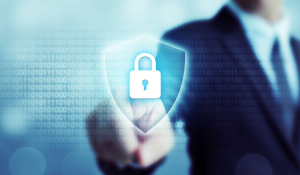The Core Principles of Endpoint Security and Why They Matter
In the high-stakes environments of modern manufacturing and healthcare, a single compromised node can disrupt life-saving services or halt global...

In the digital age, the legal landscape is rapidly evolving, and with it comes a critical imperative: cyber safety. As the legal profession increasingly relies on technology to enhance efficiency and deliver better client services, the vulnerability to cyber threats has never been more profound. Legal offices, entrusted with the protection of sensitive information and the preservation of justice, find themselves at the forefront of a new battle – defending against cyberattacks. Find out more about cyber safety in legal offices!
| TABLE OF CONTENTS |
In this blog post, we'll explore the challenges of the legal sector. But most importantly, you will find out what are the best strategies that are crucial in safeguarding the pillars of justice in our digital world. Discover how legal professionals can stand as unwavering sentinels in the face of digital threats.
In the legal sector, small and medium-sized law firms regularly face numerous IT security challenges. These challenges can arise due to the nature of their business, the sensitivity of the data they manage and limited resources.
1. Data Privacy Concerns: Legal offices handle a treasure trove of sensitive and confidential information, making them prime targets for cyberattacks. Safeguarding client data and maintaining attorney-client privilege is not only a professional ethical obligation but also a legal requirement, as breach of confidentiality can have severe legal repercussions.
2. Phishing Attacks: Cybercriminals frequently use phishing emails and social engineering techniques to trick legal professionals into revealing confidential information or installing malware. These attacks can be highly sophisticated and difficult to detect, posing a substantial challenge to maintaining cyber safety.
3. Secure Document Management: Legal offices often rely on digital document management systems, making the security of these systems paramount. Ensuring that documents are not only easily accessible to authorized personnel but also protected from unauthorized access and leaks is a delicate balance.
4. Client Trust: Maintaining client trust is crucial in the legal profession. A data breach can severely damage a law firm's reputation, potentially leading to the loss of clients. Legal offices must continually prove their commitment to cyber safety to reassure clients that their information is in safe hands.
5. Regulatory Compliance: Legal offices must navigate a complex web of data protection and privacy regulations, such as GDPR or HIPAA, depending on the type of cases they handle. Ensuring compliance with these regulations while maintaining efficient operations can be a challenging balancing act.
6. Remote Work: The shift to remote work, accelerated by recent global events, has exposed legal offices to new cybersecurity challenges. Ensuring the security of client information when accessed from various remote locations and devices is a significant concern.
7. Insider Threats: While external threats are a considerable concern, insider threats from employees or associates with malicious intent or negligence can be equally damaging. Legal offices must establish robust access controls and monitoring systems to mitigate these risks.
8. Evolving Cyber Threats: Cyber threats are constantly evolving, becoming more sophisticated and elusive. Legal offices must stay updated on the latest cyber threats and employ up-to-date security measures to counter them effectively.
9. Limited Resources: Smaller law firms may face resource constraints when it comes to investing in top-tier cybersecurity solutions and hiring dedicated IT security personnel. This limitation can make them more vulnerable to cyber threats.
10. Balancing Accessibility and Security: Legal offices need to strike a balance between providing attorneys and support staff with the necessary tools and information access while ensuring that sensitive data remains secure. This challenge involves developing and implementing robust access controls and policies.
The legal sector faces a range of cyber threats due to the sensitive and confidential nature of the information it handles. Here are 10 biggest threats in cybersecurity for the legal sector:
Data Breaches:
Data breaches are one of the most significant threats to the legal sector. These breaches can expose sensitive client information, including financial records, case details, and personal data, leading to severe legal and reputational consequences.
Phishing Attacks:
Phishing attacks, often delivered through deceptive emails, are a prevalent threat. Legal professionals may inadvertently click on malicious links, download malware, or disclose sensitive information, making them vulnerable to cybercriminals.
Ransomware:
Ransomware attacks target legal offices, encrypting their data and demanding a ransom for its release. These attacks can disrupt operations and compromise sensitive information, leading to legal and financial repercussions.
Insider Threats:
Insider threats, whether malicious or due to employee negligence, can have a significant impact on the legal sector. Employees with access to sensitive data may intentionally leak information or inadvertently expose it, leading to data breaches.
Legal offices may be targeted indirectly through their supply chain partners or third-party vendors. Cybercriminals can compromise vendors' systems and use them as a gateway to access the law firm's data.
Unsecured Remote Work:
The shift to remote work has exposed legal offices to vulnerabilities. Inadequate security measures for remote access can lead to data breaches and unauthorized access to sensitive information.
Legal Software Vulnerabilities:
Cybercriminals may exploit vulnerabilities in legal software or case management systems. These software vulnerabilities can provide access to confidential client data, which is a prime target for attackers.
Regulatory Compliance Challenges:
Maintaining compliance with various data protection regulations, such as GDPR, HIPAA, or industry-specific requirements, is an ongoing challenge. Non-compliance can lead to legal penalties and loss of reputation.
Lack of Cybersecurity Awareness:
Legal professionals are often not adequately trained in cybersecurity best practices, making them more susceptible to threats. A lack of awareness can lead to security lapses and breaches.
Advanced Persistent Threats (APTs):
Highly sophisticated APTs, often sponsored by nation-states or organized cybercriminal groups, target the legal sector to gain access to privileged information for espionage, extortion, or other illicit purposes.
Cybersecurity should be an integral part of their operations to protect client information, maintain trust, and uphold their professional and legal obligations.
DirveLock solutions improve a cyber safety in your legal office. Explore our tools and choose one which suits your needs.
Ensuring cyber safety in a legal office is paramount to protect sensitive client data, maintain professional integrity, and safeguard the practice's reputation. When considering cybersecurity for a legal office, several crucial aspects need to be addressed:
Access Control: Establish stringent access control policies and practices. Limit access to sensitive information to only those who require it and regularly review and update user access permissions.
Secure Network Infrastructure: Ensure a secure network infrastructure with robust firewalls, intrusion detection systems, and regular network security assessments to identify vulnerabilities.
Multi-Factor Authentication (MFA): Implement MFA for accessing sensitive systems and data. MFA adds an extra layer of security by requiring users to provide multiple forms of authentication.
Regular Software Updates: Keep all software, including operating systems and legal software, up to date with security patches to address known vulnerabilities.
Incident Response Plan: Develop and maintain a well-defined incident response plan. This plan should outline the steps to take in the event of a cyber incident, including data breach notifications.
Vendor and Third-Party Security: Evaluate the security practices of vendors and third-party service providers that handle your data. Ensure they have strong cybersecurity measures in place to protect your information.
Secure Remote Work: If your legal office allows remote work, ensure that remote access is secured with VPNs and that employees follow cybersecurity best practices when working outside the office.
Data Backup and Recovery: Regularly back up critical data and test data recovery procedures. In case of a ransomware attack or data loss, having reliable backups can prevent data loss and downtime.
Compliance with Regulations: Understand and adhere to the relevant data protection regulations and cybersecurity requirements specific to your legal practice. Compliance with GDPR, HIPAA, or industry-specific regulations is crucial.
Regular Security Audits and Assessments: Conduct routine security audits and assessments to identify vulnerabilities and weaknesses in your cybersecurity posture.
Security Culture: Foster a culture of cybersecurity awareness among all employees. Encourage them to report suspicious activity promptly and prioritize cybersecurity in daily operations.
Cyber Insurance: Consider investing in cyber insurance to provide financial protection in the event of a cybersecurity incident.
Legal offices can significantly enhance their cyber safety and reduce the risk of data breaches, legal repercussions, and damage to their professional reputation. Cybersecurity is not only a technological necessity but also an ethical and legal obligation in the legal sector.
Cyber safety in legal offices aren't just technological requirements; there are moral and legal obligations. It's a commitment to clients, a pledge to maintain trust, and a promise to uphold the principles of confidentiality and justice. In the evolving landscape of cyber threats, the legal sector must remain vigilant and resilient, adapting to new challenges and staying one step ahead of those who seek to compromise the profession's integrity.

In the high-stakes environments of modern manufacturing and healthcare, a single compromised node can disrupt life-saving services or halt global...

1 min read
Cybersecurity is as essential as medical expertise. Ransomware attacks on healthcare systems are increasingly putting patient lives and sensitive...
.png)
June 2024 marked the 11th anniversary of the Harvard Faculty Club's Maximize Your Board's Potential program. It was the second time I've had the...